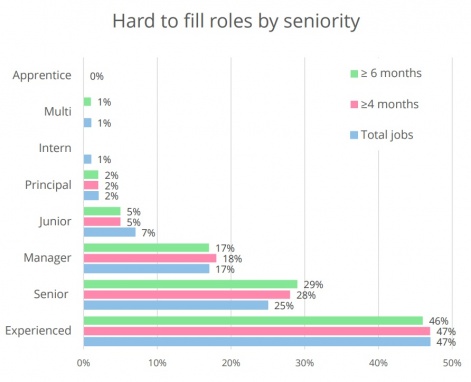A new report has called for the formation of a UK games industry-led body to tackle what it calls a skills crisis in the sector.
'The Skills Crisis in the UK Games Sector' report, published by development and publisher training provider Skillful, brought together representatives from 65 games sector employers, including Sony, EA, Ubisoft, Sumo, Playground Games, Sharkmob, Ustwo and more to discuss key recruitment and personnel challenges. Other support organisations like the British Film Institute, Games London and Ukie were also canvassed for their input.
It recommended the establishment of a new body to spearhead the creation of solutions to national skills problems, and to work with employers, policy makers, local and national government, educational institutions and other key stakeholders to enact them.
Lack of junior opportunities and skilled seniors
The study identified numerous issues and challenges, including the lack of data on skills shortages. It noted that only 7% of vacant roles were open for new entrants, which it said risks “creating a stunted pipeline of skilled workers, which could hinder future growth”.
Meanwhile, the UK is also facing challenges from a lack of skilled mid-to-senior level employees, leading to unfilled roles.

The report noted that while provisions are made for junior roles, these only represent a small number of vacancies. As such, further support should be provided to continuing professional development and upskilling mid-career talent.
A report from TIGA last year showed that 68% of studios surveyed found it "difficult" or "very difficult" to fill job vacancies, despite widespread layoffs in the sector. Games Jobs Live director Colin Macdonald also presented data showing a lack of opportunities for juniors - with just 34 roles out of 1,170 openings in November last year open to juniors - while there industry faces challenges retaining experienced staff burned by layoffs.
“The games industry appears to have an unsustainable talent structure within games development with low levels of new junior staff coming in due to a lack of staff at mid to senior level to manage them,” the Skillful report stated.
“In the initial phases of most new development projects, emphasis is placed on appointing mid to senior level staff first before expanding across various disciplines and incorporating multiple experience levels.
“When mid to senior positions remain unfilled, there's a hesitance to allocate time for supporting training, onboarding, or managing junior staff. The pressure of tight deadlines and the demands of a ‘hit-driven’ development environment pose challenges to adding further workloads.”
The first generation
The study said the first wave of UK developers are now starting to retire. This experience had historically provided the UK with a “significant advantage” over other countries, but this lead has now narrowed considerably, it said.
“Other countries have invested heavily in competitive funding and nurtured robust talent pipelines, putting them on par with, and sometimes surpassing, the UK”, the report stated.
It added: The passion and talent within the UK's existing publishing, service and development teams are undeniable. Yet, we have seen huge turmoil in recent years with huge expansion followed by contraction whilst the core skills issues still remain.
"By fostering a robust pipeline of talent, we can equip the workforce with the necessary skills to build upon the UK's legacy of games excellence."
You can see all the key recommendations for the report below:
Key Recommendations
- Establish an employer-led cross sector skills body.
- Publish regular data to support skills policy and action.
- Shift skills interventions to focus on and include mid-senior skills challenges.
- Make a concerted and collective effort to tackle the programming/technical games experience deficit.
- Align seniority descriptor for job titles.
- Consider best practices for other sectors and other countries on how to manage the workforce and talent pipeline.
- Address limited adoption of games apprenticeship by mitigating incompatibility with our current working practices.
- Research and recommend best practices for improving hybrid and remote working teams.
- Monitor and disseminate AI’s impact on skills needs of the workforce.
- Support and guide training providers to meet the needs of the UK Games Industry
- Compile and distribute available regional and national funding solutions to address the sector's key skills needs.
- Inspire employer ownership and participation in collective management of the talent pipeline and workforce development.
























